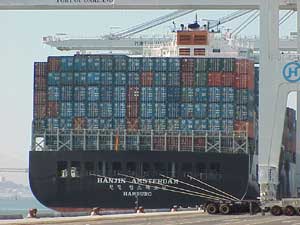Thursday, February 23, 2006
Chickens Come Home To Roost For "Security" Party

The Republican insistence on identifying itself as the "security" party is paying unwelcome dividends to President Bush on the port management controversy.
The chickens are coming home to roost now with the constituents of Republican lawmakers making their fears known in Washington.
Faced with an unprecedented Republican revolt over national security, the White House disclosed yesterday that President Bush was unaware of a Middle Eastern company's planned takeover of operations at six U.S. seaports until recent days and promised to brief members of Congress more fully on the pending deal.But congressional Republicans renewed their vow to prevent the sale from being finalized next month and warned Bush, sometimes in taunting terms, that an overwhelming majority of lawmakers will oppose the sale on national security grounds. "Dear Mr President: In regards to selling American ports to the United Arab Emirates, not just NO but HELL NO!" Rep. Sue Myrick (R-N.C.) wrote to Bush in a one-sentence letter.
The unknown wingnuts in Congress are not alone in their objections.
Senate Majority Leader Bill Frist (R-Tenn.) and House Speaker J. Dennis Hastert (R-Ill.) rejected Bush's call to allow the sale to go through early next month and they remain committed to delaying it, their spokesmen said yesterday.
Republican lawmakers have been flooded with phone calls and letters from constituents encouraging them to fight Bush over the port deal, even at the expense of GOP unity on combating terrorism -- possibly their best political issue. As a result, Bush and Republicans are divided over a national security issue as never before and bracing for a possible showdown that could force Bush to either delay the sale or veto a Republican bill against it, according to congressional and White House officials.
I don't envy the congressional staffers getting an earful on the telephone from terrified red-staters.
House Homeland Security Committee Chairman Peter T. King (R-N.Y.) said political pressure from constituents is driving the debate. Lawmakers, he said, are "responding to incredible local political pressure."
The administration does have their apologists, note the following info:
At the Treasury Department, the Committee on Foreign Investments in the United States (CFIUS), which includes Cabinet officials and White House aides, examines sales with potential national security risks and usually attracts little attention.
Administration officials did not consider the sale of port terminal management to a Middle Eastern company dangerous or potentially controversial, White House aides said. Foreign-owned companies including a Chinese operation have controlled terminals at various U.S. ports for years -- and lawmakers have rarely complained. The White House said intelligence officials reviewed the sale and raised no concerns.
This seems to be all about money.
The rich in the U.S. have always had more in common with their wealthy foreign counterparts than they have with the average American citizen.


